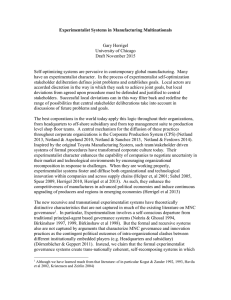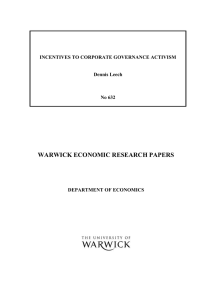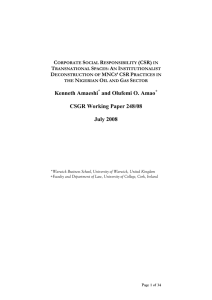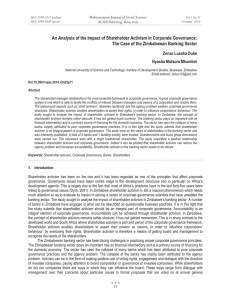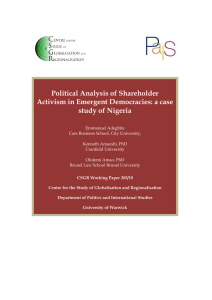International Financial Management
advertisement
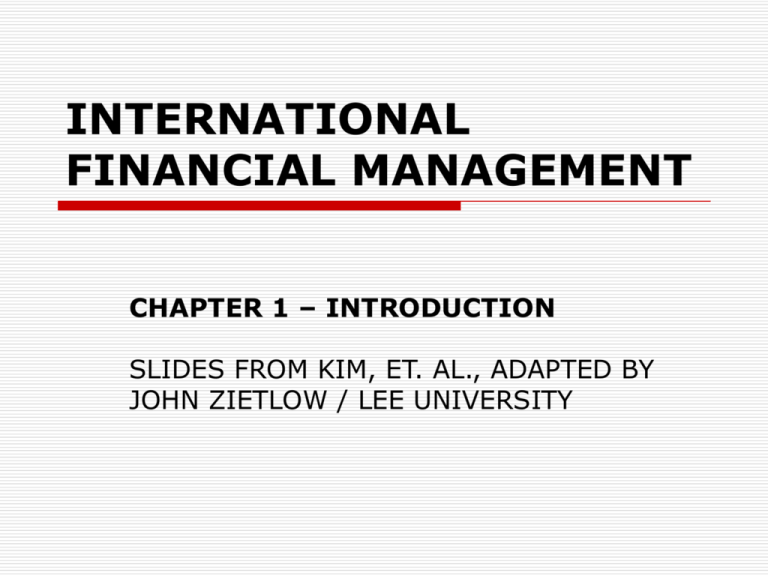
INTERNATIONAL FINANCIAL MANAGEMENT CHAPTER 1 – INTRODUCTION SLIDES FROM KIM, ET. AL., ADAPTED BY JOHN ZIETLOW / LEE UNIVERSITY PRIMARY GOAL OF A FIRM Reduce Risk Increase Profit (Cash Flows) Maximize Firm Value (Stock Price) MAJOR INTERNATIONAL TRANSACTIONS 1. Foreign Investment: direct and portfolio 2. Foreign Trade: exports and imports 3. Foreign Loans THREE REASONS TO STUDY INTERNATIONAL FINANCE 1. To understand the global economy in terms of: a. The end of the cold war. b. Industrialization and growth of the developing world. c. Increased globalization. 2. To understand the effect of global finance on business. 3. To make intelligent personal decisions. COMPANY GOALS AND FUNCTIONS OF FINANCIAL MANAGEMENT 1. MNC's goal is to maximize stockholder wealth (stock price) on a global basis. 2. Functions of international financial manager: a. Financial planning and control b. Allocation of funds (investment) c. Acquisition of funds (financing). MULTINATIONAL COMPANIES AND THEIR PERFORMANCE 1. An MNC is a company that produces a product, sells a product, and provides a service in two or more countries. “Global company” is a generic term used to describe an organization that attempts to standardize and integrate operations worldwide in all functional areas. 2. MNCs have performed better than domestic companies; this performance advantage is due to: a. Dominant risk-return tradeoff b. Market imperfections c. Portfolio effect d. Comparative advantage e. Internationalization advantages f. Larger economies of scale g. Larger valuation. AGENCY THEORY AND CORPORATE GOVERNANCE – Pg. 1 1. MNC's value is subject to larger agency cost. 2. Agency theory is a theory that deals with the conflict of interest between managers and stockholders. Managers as agents of the owners are monitored and rewarded with incentives. a. Incentives (carrot) include stock options, bonuses, and perquisites. b. Monitoring (stick) includes reviewing management perquisites, auditing financial statements, and limiting management power. c. Agency costs (costs for both incentives and monitoring) are greater for MNCs. d. These agency costs are then compared with management performance (profits and stock price). AGENCY THEORY AND CORPORATE GOVERNANCE – Pg. 2 3. Corporate governance refers to the way in which major stakeholders exert control over operations of a company. Today large institutional investors seek to maximize their returns by actively encouraging effective corporate governance practices a. Shareholder activism is any activity of an investor who tries to change the status quo through voice without the control of the company. "Voice" covers a shareholder proposal for proxy fight, direct negotiation with management, and public targeting of a corporation. b. Recent changes in US corporate governance include the threat of a hostile takeover for inefficient companies, the linkage between executive compensation and share price performance, and institutional investors' activism. c. US corporate governance is market, arm's-length transaction oriented, while Japan's corporate governance is bank, close personal-relation oriented ENVIRONMENTAL DIFFERENCES 1. MNC's value is subject to environmental constraints. 2. Risks a. Political risks include exchange controls, discrimination, and confiscation of assets. (See Chap. 19.) b. Financial risks include different exchange rates, tax laws, interest and inflation rates, and balance of payments problems. c. Regulatory risks include different legal systems, overlapping jurisdictions, and restrictive business practices. 3. Conflicts of Interest Because interest groups have diversified backgrounds, conflicts of interest exist between different interest groups, between employees, between a firm and its host government, and within a firm. 4. Multiple Environments include cultural differences and different institutional settings. 5. Environmental constraints are greater for MNCs.







